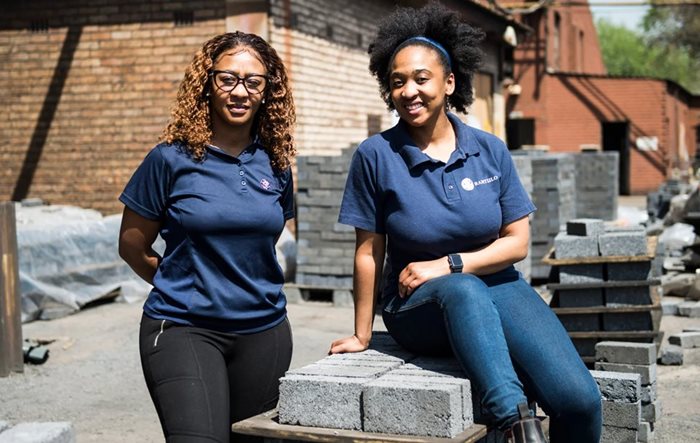
The sisters, from Sasolburg in the Free State, cofounded Ramtsilo Manufacturing and Construction - a 100% Black, female-owned company that manufactures PlastiBricks.
According to Kedibone, PlastiBricks are partly made from recycled plastic, which is “stronger than conventional bricks well-known in the market”. The bricks are being used in residential, industrial, and commercial projects and are available nationally at building material retailers.
I caught up with Kedibone to learn more about Ramtsilo Manufacturing and Construction, PlastiBricks, and the solution they are bringing to the building materials industry.
Ramtsilo Manufacturing and Construction is a production plant manufacturing a brick partly made from recycled plastic which is stronger than conventional bricks well-known in the market - Plastibricks.
The introduction of PlastiBricks has created a solution to plastic pollution, the greatest benefit being that we are able to recycle any type of plastic which traditional recycling methods are unable to do. The bricks are strong, durable, and fire-retardant.
While there are similar plastic bricks in the market, what makes us stand out is how construction-friendly our bricks are. There is no need for the contractor to purchase any special adhesive or material to use in conjunction with our brick as they have the same look and feel as conventional cement bricks.
We actually did not think we would become entrepreneurs. We grew up in a construction household with my father having a general building and civil engineering company many years ago.
We went on-site with him and this created an interest in construction which led to him registering a construction business for us. After doing general building projects, we identified that we spend a lot on building materials, specifically bricks, so we started manually manufacturing conventional cement bricks that we used in the construction projects.
We, however, wanted to manufacture a product that was different, innovative, and set us apart, and after talking to waste collectors in the township, we understood the impact of plastic recycling in the community.
That is how we got into prototyping the use of plastic in the construction industry. After more than a year of prototyping, we had a product we were comfortable with which we took in for testing.
Chemical Recycling: Our plastic brick is manufactured in such a way that no plastic will ever leak into the environment even after a building is demolished #alternativebuildingtechnology #plasticbrickbrick #plasticrecycling #sustainability #circulareconomy pic.twitter.com/Sqj7keUylE
— Ramtsilo “Plastic Bricks” (@ramtsilo) October 4, 2021
 What are some of the obstacles you've had to face since you started?
What are some of the obstacles you've had to face since you started?We are in an industry that is male-dominated, so we constantly have to work extra hard to prove ourselves in the market. It is often the case that after we present what we do, people ask, ‘So where is your boss?’.
In 2022, we still find ourselves having to convince some people that young women are disrupting one of the most traditionally male-dominated industries.
Our bricks use less water to manufacture and there’s less water needed during construction. They have higher compressive strength at a lesser cost, are less porous, and last longer than conventional bricks, which means no cracks on your wall for a longer period of time, thus ensuring structural integrity.
They are also fire-retardant and provide greater insulation and energy efficiency which means your home is cooler in summer and retains heat in winter.
We have gained so much experience and knowledge from the Pitch and Polish Competition experience that we make use of in our everyday work, including product costing, framing, and communicating our value proposition.
I believe they have started playing a significant role. We are having the right conversations, forming synergies, and working together to find lasting solutions to this global problem.
The integration of 4IR into the circular economy. Technology has taken the world by storm and the green economy will not be left behind.
Startups have it hard - the red tape, limited resources, and lack of information. The cost of doing business in SA is still very high, market access is still a challenge, however, I would also like to see us as entrepreneurs taking ourselves as business owners, our businesses, and our value proposition a lot more seriously.
We constantly apply for business training, pitching competitions such as the Engen Pitch and Polish, as well as business incubation so that we can gain more business acumen and become more resilient in the quest for success.
The future is definitely exciting for us. We see Ramtsilo Manufacturing and Construction growing both nationally and in the SADC region within the next five years.
We would also like to see more people playing an active role in recycling as a result of the awareness and understanding of what we do. We all have a part to play in the circular economy.